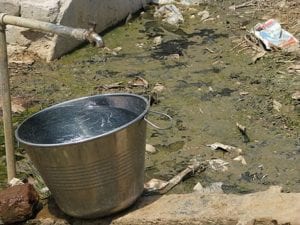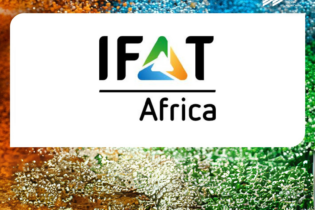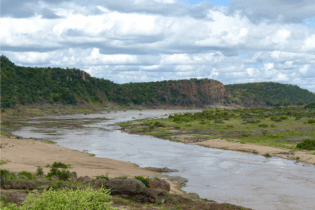On 20April 2012, the Thebe Foundation – in association with the Bongi Ngema–Zuma Foundation – fulfilled a long-held promise to King Goodwill Zwelithini to provide a rural community on the Nkunzana River in northern KZN with safe drinking water.
This initiative is a result of the leading-edge technology provided by Headstream Water Holdings, an associate of Thebe’s Power and Infrastructure division, and a sponsorship by FX Africa Foreign Exchange, a subsidiary of Thebe Tourism Group. The project aims to assist the South African government address the country’s water provision backlogs by making it easier for rural households to access water from rivers and ensure that the water is clean and free of waterborne diseases. Mokgethi Tshabalala, CEO of Thebe Foundation, was delighted to be part of this initiative aimed at making a difference to rural communities.“This is a tangible example of how the Thebe Group, through the Foundation, contributes to the upliftment of local communities,” he said. Clean water as a basic human right In July 2010 the United Nations General Assembly declared clean drinking water and sanitation a human right essential to the full enjoyment of life and all other human rights. According to the WHO/UNICEF Joint Monitoring Programme, nearly 900 million people in the world do not have access to safe drinking water, of which an estimated 300 million are in sub-Saharan Africa. In addition to continued lack of access to improved drinking-water sources, 2.6 billion people lack access to basic sanitation. Approximately 1.5 million children under five years die every year as a result of diseases linked to lack of access to water and sanitation. South Africa has made significant reforms to adopt an integrated approach to water resource management (IWRM), where water security for poverty alleviation and growth features as a national priority. This movement was crystalised in the National Water Act of 1999, which described water access as a fundamental human right.(The South Africa- Netherlands Water Network – www.waternetwork.co.za) Today, 88% of South African households have access to water services compared to 59% in 1994, and 73% of households have access to basic sanitation compared to 48% in 1994. However, fresh water availability is at a critical stage due to the scarcity and seasonal nature of natural water resources, unchecked development, poverty and limited financial resources. As a result, over 4 million people in South Africa do not have access to clean water. Current purification methods Boiling water will purify water enough to drink however all this does is cook everything to an edible stage which will impact on the taste and smell. Water purification tablets are expensive and produce safe, albeit foul-tasting water. For high quality, great tasting water, filtration is the best option. Water purification via filtration offers the advantage of a higher quality and better tasting water simply by running through gradually smaller and smaller filters until the output is pure, bacteria-free water. Advances in ceramic filters with activated charcoal have made water filtration more effective and less costly because they can be re-usable. Not all water filter systems are created equal though, and some are expensive, complex and of limited efficacy depending on the technology deployed. The technology As part of the initiative, the Foundation gifted over 160 ceramic candle filter (CCF) units to community members in Nkunzana village who draw water from the Nkunzana River for household use. The units were assembled and supplied by Headstream whose focus is the provision of innovative solutions to the provision of water treatment infrastructure in sub-Saharan Africa. The CCF system comprises two 20 ℓ plastic containers mounted on top of each other and fitted with a dome shaped, silver impregnated ceramic candle filter designed to inhibit the growth of bacteria, fungi and some viruses found in surface water. This in turn is covered by a cloth which traps large particles such as grass and leaves and reduces turbidity, rendering the water clear and opaque. The bottom container is fitted with a tap that dispenses about four litres of treated water per hour and the flow rate can be increased by using a hand pipe if required. Eight members of the community have been trained in the assembly, care and maintenance of the filters with further training and follow-up visits scheduled.Hippo water rollers
Given that transportation of water to these households can be a back-breaking and time-consuming task, Tshabalala turned to Thebe subsidiary, FX Africa Foreign Exchange, to sponsor100 Hippo water rollers to accompany the filter units. The Hippo roller is a South African innovation that allows an individual to transport more than 90 litres of water across uneven terrain, with relative ease. The Hippo roller comprises a strong drum and handle and when full, has an effective weight of only 10 kg on level ground, allowing even children to roll the water home safely. Approximately 38000 Hippo rollers have been distributed worldwide, directly benefitting in excess of 250000 people. “Traditionally, communities had very little options when it came to collecting water from a river, and many people suffer significant health risks as a result of walking many kilometres balancing heavy 20 ℓ buckets on their heads. The Hippo roller saves time and energy and prevents premature aging of the spine and hair loss – both occupational hazards if you regularly bear heavy items on your head,” said Tshabalala. Once home, the water can be decanted into the CCF filter system which has been proven to remove more than 99% of disease-causing pathogens found in river water to produce water that is safe for drinking. Stakeholders Thebe Group Chairman, Vusi Khanyile, said:“I cannot think of a better way to celebrate 20 years of commercial success than by the launch of a community development initiative such as this. I am very proud of Headstream and FX Africa Foreign Exchange for embracing the aims of the Thebe Foundation and ensuring the success of this particular initiative. I have great hopes that the Foundation will be able to drive the overarching group strategy on community development and to create a framework to support the excellent work being done across the group.” Andre Bouwer, CEO of FX Africa Foreign Exchange said: “FX Africa is honoured to be involved with the Thebe Foundation’s support of such a special project. Access to clean water is a key necessity in our lives, and one which we take for granted. We are privileged to have had the opportunity to assist the community of Nkunzana River by providing the Hippo water rollers which will improve and make a difference in their daily lives”. Justin Moore, CEO of Headstream Water Holdings said: “Our mission is to make a meaningful contribution towards the efficient use of water and energy resources in sub-Saharan Africa by providing high quality, practical and sustainable technologies to protect the environment and uplift communities. These CCF filters are based on one of the most effective and advanced filtration technologies available and will provide an immediate positive impact in communities affected by polluted water.” Headstream’s Just Water Filters The CCF units distributed by King Zwelithini to community members of Nkunzana village are among the most advanced in the world, having been independently proven to remove more than 99% of disease-causing pathogens found in river water. The patented filtration technology was developed by Just Water Filters, a private sector humanitarian aid agency headquartered in Austin, Texas. Its primary objective is to bring instant relief to communities affected by natural disasters or manmade pollution and have thus far deployed their filters in 57 countries. The beauty of the CCF unit lies in its combination of simplicity and efficacy. From the outside, the unit resembles two 20 ℓ plastic containers mounted on top of each other. The difference lies in the unique dome-shaped, silver impregnated ceramic candle filter in the heart of the system, which prevents the growth of bacteria (mitosis) by providing a hostile environment for all microbiological organisms. The filtration efficiency is 0.2 micron thereby guaranteeing the removal of all bacteria from polluted water for the provision of clean drinking and cooking water. According to one independent test: “What this means is that even with very poor quality input water, the water produced by the Just Water system is up to 40% more pure than standard United States (US) municipality water supplies and better quality than almost all bottled water.”http://www.majorpandemic.com/2011/11/monolithic-just-water-ceramic-filter.html?utm_source=BP_recent The CCF unit is extremely simple to operate: dirty river water poured into the top container is gravity fed through the filter to the bottom container which is equipped with a plastic tap which dispenses clean drinking water. There are no chemicals involved and no need to boil the water before use. Ceramic elements may be cleaned 100 or more times with a soft brush or damp cloth. The simple gravity drip system can generate up to 50 ℓ of clean water over a 12 hour filtration process, providing clean cooking and drinking water for a family of 10 daily. The main advantages of the system are:- easy to install
- accepts water from floods, lake, rain, well, tap, river or stream
- removes 99% of all known bacteria and disease-causing pathogens in water
- good flow rate – produces up to 4 ℓ of clean water per hour (gravity flow)
- annual/semi-annual filter replacement
- once in use, filter will last 6-8 months
- minimal maintenance – wipe with clean, damp cloth
- reasonably priced and available in various configurations and sizes.
- US National Sanitation Foundation (NSF) Standard 42
- US National Sanitation Foundation (NSF) Standard 53
- ISO 9002 Quality Standard
- British 5750 Quality Standard
- United Kingdom Water Research Council (WRC) Performance Standards







